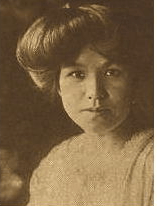Tsuruko Haraguchi facts for kids
Quick facts for kids
Tsuruko Haraguchi
|
|
|---|---|

Haraguchi, c. 1909
|
|
| Born |
Tsuru Arai (新井つる)
June 18, 1886 Tomioka, Gunma, Japan
|
| Died | 26 September 1915 (aged 29) |
| Alma mater | Japan Women's University, Teachers College, Columbia University |
| Occupation | Academic psychologist |
| Scientific career | |
| Thesis | Mental Fatigue (1912) |
| Doctoral advisor | Edward Thorndike |
| Other academic advisors | Matatarō Matsumoto, Robert S. Woodworth, James McKeen Cattell |
| Influenced | Tomi Wada |
Tsuruko Haraguchi (Japanese: 原口鶴子, 18 June 1886 – 26 September 1915) was a Japanese psychologist. She made history as the first Japanese woman to earn a PhD degree, which is a very high university degree.
Contents
Early Life and Education
Tsuruko Haraguchi was born Tsuru Arai in Tomioka, Japan, in 1886. Her father was a wealthy farmer. She had two sisters. Tsuruko was very smart. She finished Takasaki Women's High School in 1902. This was two years earlier than other students her age.
In 1903, she started studying at Japan Women's University. She focused on humanities and English literature. At that time, women in Japan could not get advanced degrees. Universities for women were also not officially recognized. Her mentor, a psychologist named Matatarō Matsumoto, encouraged her to study more. So, after graduating in 1906, she moved to the United States.
Studying at Columbia University
In 1907, Haraguchi joined the Teachers College at Columbia University. She planned to get her PhD in Psychology. She focused on experimental psychology and education. She learned from famous professors like Edward Thorndike, Robert S. Woodworth, and James McKeen Cattell.
Her main research was about "Mental Fatigue." This means how tired your brain gets from thinking a lot. Professor Thorndike helped her with this research. She studied how mental work affects your body and how well you can think. Her PhD paper included four different studies. In three of these studies, she was the only person being tested!
Her Experiments on Mental Fatigue
- Experiment 1: Tsuruko multiplied four-digit numbers in her head. She did this for up to eleven hours straight for several days. She only stopped to write down how long each problem took. She also stopped to eat. Before and after these math tests, she did another test. She translated German words into English. She recorded how long it took her to remember the correct translation. This helped her see if brain tiredness from one task moved to another.
- Experiment 2: She did the same math and translation tasks as in Experiment 1. But this time, she also checked her pulse. She wrote down how she felt and her health. This experiment lasted for 78 days.
- Experiment 3: Tsuruko translated sentences from John Dewey's writings into Japanese. She recorded how long it took her to translate each page. She also measured the temperature under her tongue.
- Experiment 4: This was the only experiment with more than one person. She had 26 people help her. They did many tasks. These included memorizing made-up words, adding numbers, and doing more mental math. Their pulse was checked after each test.
Haraguchi's studies showed that being mentally tired can affect how well you do tasks. She found that brain tiredness could move from one task to another. She also saw that people got better at tasks the more they practiced. After five years of hard work, Tsuruko Haraguchi earned her PhD on June 5, 1912. She was the first Japanese woman to get a PhD in any field! She got married on the same day.
Life After Her PhD
After getting her PhD, Haraguchi went back to Japan. She made her PhD paper bigger and translated it into Japanese. It was published in 1914 as Studies on Mental Work and Fatigue. She sometimes gave lectures at Japan Women's University. She also helped set up a special lab there for experimental psychology.
In 1915, she wrote a book called Tanoshiki omohide, which means "Pleasant memoirs." In this book, she shared her experiences from Columbia University. She used her story to encourage more education for women. She also wrote about how important women are.
Personal Life
Tsuruko Haraguchi married Takejirō Haraguchi on June 5, 1912. He was a professor at Waseda University. They had a son and a daughter together.
Death and Lasting Impact
Tsuruko Haraguchi sadly passed away from tuberculosis on September 26, 1915. She was only 29 years old. Her last work was a Japanese translation of a book called Hereditary Genius by Francis Galton. It was published after her death in 1915. Another book, Happy Memories, was also published in 1915. It shared her experiences at Columbia University and her thoughts on cultural differences between Japan and the U.S.
Tsuruko Haraguchi's life and work have been remembered in two documentaries: The Life of Tsuruko Haraguchi (2007) and Psychologist Tsuruko Haraguchi: Memories of Her Days at Columbia University in the Early 1900s (2008). She is remembered as a pioneer for women in science and education.
 | Victor J. Glover |
 | Yvonne Cagle |
 | Jeanette Epps |
 | Bernard A. Harris Jr. |

